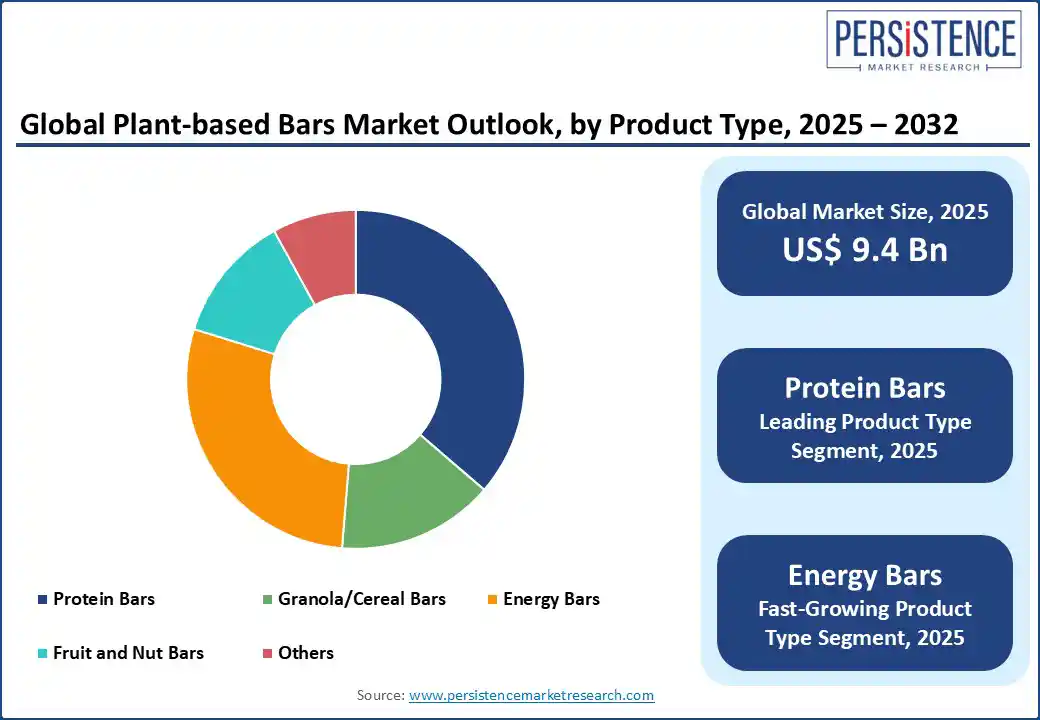ID: PMRREP35523| 188 Pages | 29 Jul 2025 | Format: PDF, Excel, PPT* | Food and Beverages

The plant-based bars market size is likely to be valued at US$ 9.4 Bn in 2025 and is estimated to reach US$ 15.2 Bn in 2032, growing at a CAGR of 8.8% during the forecast period 2025-2032.
The plant-based bars market is emerging as a high-growth frontier in the global snack food sector. It is propelled by increasing consumer shift toward plant-forward diets and functional snacking. With plant-based products now a strategic priority for food and beverage brands, bars stand out for their versatility and scalability. Backed by a surging base of health-conscious millennials and Gen Z consumers, the category is positioned for sustained momentum. While established players benefit from distribution networks and brand recognition, start-ups are capturing attention through niche positioning such as gut-friendly and immunity-boosting bars.

Key Industry Highlights
| Global Market Attribute | Key Insights |
| Plant-based Bars Market Size (2025E) | US$ 9.4 Bn |
| Market Value Forecast (2032F) | US$ 15.2 Bn |
| Projected Growth (CAGR 2025 to 2032) | 8.8% |
| Historical Market Growth (CAGR 2019 to 2024) | 7.1% |
The rise of vegan and vegetarian diets is directly fueling the plant-based bars market growth by creating a sustained demand for portable, high-protein, and meat-free snacking solutions. The current surge in vegetarianism is mainly influenced by a broad lifestyle shift toward plant-forward eating for health, climate, and animal welfare. According to a 2024 report by The Smart Protein Project (EU), 21% of individuals in Europe identify as flexitarian and around 7% as vegetarian or vegan. Snack bars are considered one of the most commonly sought product categories among plant-based convenience foods in the continent.
As plant-based eaters often face gaps in on-the-go protein or energy options, bars offer a ready-made solution that does not require preparation, refrigeration, or cooking skills. These products are hence attracting busy urban consumers, students, and professionals. Global events such as Veganuary, which witnessed over 700,000 sign-ups in 2024, also contribute to trial spikes for plant-based snack bars during promotional periods. Several brands use such campaigns to introduce limited-edition vegan SKUs or sample packs to capitalize on the overlap between ethical diets and wellness-oriented snacking.
The taste and texture gap between plant-based bars and traditional snack bars continues to be a significant barrier to broad market penetration. It is specifically evident among mainstream consumers who prioritize indulgence and sensory satisfaction over clean-label credentials. Despite rising interest in plant-based diets, several first-time buyers find the chalky mouthfeel, earthy aftertaste, or dry, dense texture of plant-based bars off-putting. This challenge is acute in the high-protein plant-based bar segment, where brands often use pea or brown rice protein.
Even with masking agents such as cocoa or nut butter, a few products fail to replicate the smooth, chewy texture of whey-based bars. In Germany and Canada, where plant-based snack is mainstream, repeat purchase rates for plant-based bars are 18 to 22% lower than those for traditional snack bars, reveals a new report. This indicates that while trial is increasing, loyalty is constrained by inconsistent sensory experiences.
The integration of functional ingredients is opening new growth avenues for plant-based bar brands by enabling them to target specific health outcomes. Consumers are increasingly seeking multifunctional snacks that offer more than just calories or protein. Plant-based bars with added benefits are hence commanding greater shelf space and premium price points. Brands are innovating with ingredients such as ashwagandha, maca, L-theanine, MCT oil, probiotics, and adaptogenic mushrooms.
U.S.-based IQBAR, for example, has gained traction by incorporating brain-supporting ingredients such as lion’s mane and omega-3-rich flax into its bars. These are marketed toward professionals and students requiring sustained mental clarity. Similarly, BelliWelli uses probiotics and low-FODMAP ingredients to appeal to consumers with digestive sensitivities, a booming segment in the plant-based landscape.
By product type, the market is divided into protein bars, granola/cereal bars, energy bars, and fruit and nut bars. Out of these, protein bars are expected to account for nearly 36.3% of the plant-based bars market share in 2025 owing to increasing focus on daily protein intake among flexitarians, vegans, and fitness-focused individuals. These offer a tangible health claim, typically 10 to 20g of protein per serving, which makes them attractive to performance-focused users. In addition, protein bars allow for higher price points compared to regular snack bars due to their perceived value as a nutritional supplement. This further enables better margins for manufacturers.
Plant-based energy bars are gaining impetus as these cater to a wide demographic seeking sustained energy without resorting to artificial stimulants or animal-based ingredients. These are positioned as daily fuel for mental and physical performance, often targeting students, professionals, commuters, and outdoor enthusiasts. The rapid shift away from sugar-laden snacks and caffeine dependence toward more natural energy sources is another key driver. Additionally, cyclists, hikers, and digital nomads are demanding non-refrigerated, lightweight energy-dense options, thereby augmenting sales.
In terms of nature, the market is bifurcated into organic and conventional. Among these, the conventional segment will likely hold about 84.3% of share in 2025, backed by rising demand for transparency, minimal processing, and recognizable ingredients. Conventional bars are mainly made from whole food ingredients such as nuts, seeds, dried fruits, and grains without heavy fortification or synthetic additives. Hence, these cater to consumers who view plant-based eating not just as a diet but as a lifestyle rooted in natural wellness and ingredient simplicity.
Organic plant-based bars are gaining popularity globally due to their ability to provide a high level of assurance regarding ingredient integrity, which is scrutinized by modern buyers. As transparency becomes a decisive factor in food choices, consumers are gravitating toward certified organic bars that avoid pesticide residues, GMOs, synthetic preservatives, and artificial sweeteners. Organic certification also helps mitigate concerns about cumulative chemical exposure, particularly among parents purchasing snack bars for children.

In North America, plant-based bars are transitioning from niche health food products to mainstream convenience snacks. The U.S. plant-based bars market is anticipated to remain at the forefront due to increasing interest of consumers in clean-label, allergen-free, and functional snack options. They are not just looking for plant-based credentials but prioritizing protein content, satiety, and added wellness benefits such as gut health or mental clarity. It has resulted in a surge in SKUs featuring pea protein, pumpkin seeds, dates, and adaptogens.
Innovation is rapid with companies such as Lärabar extending their fruit-and-nut based offerings into protein-rich and dessert-inspired lines. Mid-Day Squares, a Canada-based start-up, is capitalizing on the indulgence-meets-functionality trend by offering chocolate-based bars with plant protein and prebiotics. At the same time, it is striving to maintain refrigerated distribution to emphasize freshness and minimal processing. Brands such as IQBAR and BelliWelli are further targeting neuro and digestive health, respectively.
In 2025, Europe is poised to account for approximately 35.4% of share as consumers increasingly seek on-the-go snacks associated with sustainability and wellness values. As per a 2024 online survey, one in three individuals in Europe under 35 regularly consumes plant-based snacks, with bars being among the most preferred formats due to portability and perceived health benefits. Demand is particularly high in Germany, the U.K., and the Netherlands, where plant-forward eating is pushed by ethical concerns.
Domestic brands are leveraging local sourcing and clean-label claims to differentiate. For instance, Trek Bars (UK) and Foodspring (Germany) have reformulated several SKUs to eliminate artificial sweeteners and emulsifiers. They focus on complying with stringent EU regulations and consumer scrutiny around ultra-processed foods. Sustainability also remains a strong purchase driver. Bars packaged in compostable or recyclable wrappers and products with third-party certifications such as CarbonNeutral or Soil Association Organic are performing better.
In Asia Pacific, the market is still nascent but developing gradually, augmented by urban health consciousness, lactose intolerance prevalence, and demand for convenient functional food. China, Japan, India, and Australia are emerging as key hotspots. Local start-ups and global brands are introducing bars that merge traditional ingredients, including matcha, black sesame, adzuki beans, and turmeric, with modern superfoods to create culturally resonant yet healthy offerings.
In India, the market is fueled by a large vegetarian population and a rising appetite for protein-rich snacks among Gen Z and millennials. Brands such as The Whole Truth and Yogabar have launched plant-protein bars using nuts, dates, and pea protein, with many avoiding added sugars or artificial flavors. In China, increasing concerns about food safety and animal-origin ingredients have prompted sales of bars made with mung bean protein and quinoa. In Australia, Blue Dinosaur and Health Lab are developing bars with clean labels and no refined sugar. In Thailand and Singapore, these bars are increasingly marketed through gyms, wellness cafés, and specialty stores.

The plant-based bars market is characterized by innovation, functional positioning, and brand differentiation. Key players are no longer just focused on offering vegan or dairy-free options. They are integrating adaptogens, high-protein blends, and low-sugar or keto-friendly formulations to cater to niche lifestyle preferences. A few brands are reformulating their products to associate with emerging wellness trends such as gut health and clean labeling. Start-ups are leveraging influencer-based marketing and transparent ingredient sourcing to stand out in a saturated market.
The market is projected to reach US$ 9.4 Bn in 2025.
Increased focus on sustainability and rising adoption of vegan diets are the key market drivers.
The market is poised to witness a CAGR of 8.8% from 2025 to 2032.
Co-branding with fitness influencers and expanding distribution in travel retail are the key market opportunities.
Kellogg Company, Greens Gone Wild, LLC, and 88 ACRES are a few key market players.
| Report Attribute | Details |
| Historical Data/Actuals | 2019 - 2024 |
| Forecast Period | 2025 - 2032 |
| Market Analysis Units | Value: US$ Bn/Mn, Volume: As Applicable |
| Geographical Coverage |
|
| Segmental Coverage |
|
| Competitive Analysis |
|
| Report Highlights |
|
| Customization and Pricing | Available upon request |
By Product Type
By Nature
By Distribution Channel
By Region
Delivery Timelines
For more information on this report and its delivery timelines please get in touch with our sales team.
About Author